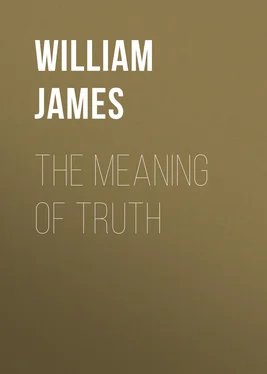William James - The Meaning of Truth
Здесь есть возможность читать онлайн «William James - The Meaning of Truth» — ознакомительный отрывок электронной книги совершенно бесплатно, а после прочтения отрывка купить полную версию. В некоторых случаях можно слушать аудио, скачать через торрент в формате fb2 и присутствует краткое содержание. Жанр: foreign_antique, Философия, foreign_edu, на английском языке. Описание произведения, (предисловие) а так же отзывы посетителей доступны на портале библиотеки ЛибКат.
- Название:The Meaning of Truth
- Автор:
- Жанр:
- Год:неизвестен
- ISBN:нет данных
- Рейтинг книги:3 / 5. Голосов: 1
-
Избранное:Добавить в избранное
- Отзывы:
-
Ваша оценка:
- 60
- 1
- 2
- 3
- 4
- 5
The Meaning of Truth: краткое содержание, описание и аннотация
Предлагаем к чтению аннотацию, описание, краткое содержание или предисловие (зависит от того, что написал сам автор книги «The Meaning of Truth»). Если вы не нашли необходимую информацию о книге — напишите в комментариях, мы постараемся отыскать её.
The Meaning of Truth — читать онлайн ознакомительный отрывок
Ниже представлен текст книги, разбитый по страницам. Система сохранения места последней прочитанной страницы, позволяет с удобством читать онлайн бесплатно книгу «The Meaning of Truth», без необходимости каждый раз заново искать на чём Вы остановились. Поставьте закладку, и сможете в любой момент перейти на страницу, на которой закончили чтение.
Интервал:
Закладка:
Our terminology shall follow the spirit of these remarks. We will deny the function of knowledge to any feeling whose quality or content we do not ourselves believe to exist outside of that feeling as well as in it. We may call such a feeling a dream if we like; we shall have to see later whether we can call it a fiction or an error.
To revert now to our thesis. Some persons will immediately cry out, 'How CAN a reality resemble a feeling?' Here we find how wise we were to name the quality of the feeling by an algebraic letter Q. We flank the whole difficulty of resemblance between an inner state and an outward reality, by leaving it free to any one to postulate as the reality whatever sort of thing he thinks CAN resemble a feeling,—if not an outward thing, then another feeling like the first one,—the mere feeling Q in the critic's mind for example. Evading thus this objection, we turn to another which is sure to be urged.
It will come from those philosophers to whom 'thought,' in the sense of a knowledge of relations, is the all in all of mental life; and who hold a merely feeling consciousness to be no better—one would sometimes say from their utterances, a good deal worse—than no consciousness at all. Such phrases as these, for example, are common to-day in the mouths of those who claim to walk in the footprints of Kant and Hegel rather than in the ancestral English paths: 'A perception detached from all others, "left out of the heap we call a mind," being out of all relation, has no qualities—is simply nothing. We can no more consider it than we can see vacancy.' 'It is simply in itself fleeting, momentary, unnameable (because while we name it it has become another), and for the very same reason unknowable, the very negation of knowability.' 'Exclude from what we have considered real all qualities constituted by relation, we find that none are left.'
Altho such citations as these from the writings of Professor Green might be multiplied almost indefinitely, they would hardly repay the pains of collection, so egregiously false is the doctrine they teach. Our little supposed feeling, whatever it may be, from the cognitive point of view, whether a bit of knowledge or a dream, is certainly no psychical zero. It is a most positively and definitely qualified inner fact, with a complexion all its own. Of course there are many mental facts which it is NOT. It knows Q, if Q be a reality, with a very minimum of knowledge. It neither dates nor locates it. It neither classes nor names it. And it neither knows itself as a feeling, nor contrasts itself with other feelings, nor estimates its own duration or intensity. It is, in short, if there is no more of it than this, a most dumb and helpless and useless kind of thing.
But if we must describe it by so many negations, and if it can say nothing ABOUT itself or ABOUT anything else, by what right do we deny that it is a psychical zero? And may not the 'relationists' be right after all?
In the innocent looking word 'about' lies the solution of this riddle; and a simple enough solution it is when frankly looked at. A quotation from a too seldom quoted book, the Exploratio Philosophica of John Grote (London, 1865), p. 60, will form the best introduction to it.
'Our knowledge,' writes Grote, 'may be contemplated in either of two ways, or, to use other words, we may speak in a double manner of the "object" of knowledge. That is, we may either use language thus: we KNOW a thing, a man, etc.; or we may use it thus: we know such and such things ABOUT the thing, the man, etc. Language in general, following its true logical instinct, distinguishes between these two applications of the notion of knowledge, the one being yvwvai, noscere, kennen, connaitre, the other being eidevai, scire, wissen, savoir. In the origin, the former may be considered more what I have called phenomenal—it is the notion of knowledge as ACQUAINTANCE or familiarity with what is known; which notion is perhaps more akin to the phenomenal bodily communication, and is less purely intellectual than the other; it is the kind of knowledge which we have of a thing by the presentation to the senses or the representation of it in picture or type, a Vorstellung. The other, which is what we express in judgments or propositions, what is embodied in Begriffe or concepts without any necessary imaginative representation, is in its origin the more intellectual notion of knowledge. There is no reason, however, why we should not express our knowledge, whatever its kind, in either manner, provided only we do not confusedly express it, in the same proposition or piece of reasoning, in both.'
Now obviously if our supposed feeling of Q is (if knowledge at all) only knowledge of the mere acquaintance-type, it is milking a he-goat, as the ancients would have said, to try to extract from it any deliverance ABOUT anything under the sun, even about itself. And it is as unjust, after our failure, to turn upon it and call it a psychical nothing, as it would be, after our fruitless attack upon the billy-goat, to proclaim the non-lactiferous character of the whole goat-tribe. But the entire industry of the Hegelian school in trying to shove simple sensation out of the pale of philosophic recognition is founded on this false issue. It is always the 'speechlessness' of sensation, its inability to make any 'statement,'[Footnote: See, for example, Green's Introduction to Hume's Treatise of Human Nature, p. 36.] that is held to make the very notion of it meaningless, and to justify the student of knowledge in scouting it out of existence. 'Significance,' in the sense of standing as the sign of other mental states, is taken to be the sole function of what mental states we have; and from the perception that our little primitive sensation has as yet no significance in this literal sense, it is an easy step to call it first meaningless, next senseless, then vacuous, and finally to brand it as absurd and inadmissible. But in this universal liquidation, this everlasting slip, slip, slip, of direct acquaintance into knowledge-ABOUT, until at last nothing is left about which the knowledge can be supposed to obtain, does not all 'significance' depart from the situation? And when our knowledge about things has reached its never so complicated perfection, must there not needs abide alongside of it and inextricably mixed in with it some acquaintance with WHAT things all this knowledge is about?
Now, our supposed little feeling gives a WHAT; and if other feelings should succeed which remember the first, its WHAT may stand as subject or predicate of some piece of knowledge-about, of some judgment, perceiving relations between it and other WHATS which the other feelings may know. The hitherto dumb Q will then receive a name and be no longer speechless. But every name, as students of logic know, has its 'denotation'; and the denotation always means some reality or content, relationless as extra or with its internal relations unanalyzed, like the Q which our primitive sensation is supposed to know. No relation-expressing proposition is possible except on the basis of a preliminary acquaintance with such 'facts,' with such contents, as this. Let the Q be fragrance, let it be toothache, or let it be a more complex kind of feeling, like that of the full-moon swimming in her blue abyss, it must first come in that simple shape, and be held fast in that first intention, before any knowledge ABOUT it can be attained. The knowledge ABOUT it is IT with a context added. Undo IT, and what is added cannot be CONtext. [Footnote: If A enters and B exclaims, 'Didn't you see my brother on the stairs?' we all hold that A may answer, 'I saw him, but didn't know he was your brother'; ignorance of brotherhood not abolishing power to see. But those who, on account of the unrelatedness of the first facts with which we become acquainted, deny them to be 'known' to us, ought in consistency to maintain that if A did not perceive the relationship of the man on the stairs to B, it was impossible he should have noticed him at all.]
Читать дальшеИнтервал:
Закладка:
Похожие книги на «The Meaning of Truth»
Представляем Вашему вниманию похожие книги на «The Meaning of Truth» списком для выбора. Мы отобрали схожую по названию и смыслу литературу в надежде предоставить читателям больше вариантов отыскать новые, интересные, ещё непрочитанные произведения.
Обсуждение, отзывы о книге «The Meaning of Truth» и просто собственные мнения читателей. Оставьте ваши комментарии, напишите, что Вы думаете о произведении, его смысле или главных героях. Укажите что конкретно понравилось, а что нет, и почему Вы так считаете.












